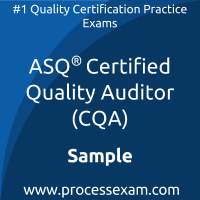01. During the opening meeting, which aspect should be considered with respect to the language used during the audit?
a) Assessing the auditee's personnel language proficiency
b) Ensuring that all audit team members are fluent in the auditee's primary language
c) Confirming the language to be used during the audit
d) The language proficiency level of each auditor and auditee
02. Which of the following best describes quality control?
a) The overall intentions and directions of an organization with regard to quality, as formally expressed by top management
b) The activities that establish the objectives and requirements for quality and for the application of quality system elements
c) The organizational structure and the procedures, processes, and resources needed to implement quality management
d) The operational techniques and activities that are used to fulfill requirements for quality
03. In the context of HACCP, what is the primary function of a critical control point (CCP)?
a) To detect nonconformities in the production process
b) To monitor the quality of raw materials and finished products
c) To control a specific hazard at a specific step in the process
d) To ensure that all food safety regulations are being followed
04. Which of the following soft skills is most important for a quality auditor when conducting interviews during the audit process?
a) Persuasive abilities to convince the interviewee to share information
b) Public speaking skills to present findings to a large audience
c) Conflict resolution skills to manage disagreements among audit team members
d) Active listening skills to accurately understand the interviewee's perspective
05. How can the interrelationship between sales and production departments potentially lead to conflicts?
a) Sales can promise unrealistic delivery dates, causing pressure on production
b) Sales and production both focus on customer satisfaction
c) Both departments have a common interest in increasing revenue
d) Sales departments may favour long-term projects over short-term one
06. In which stage of a business relationship is due diligence typically conducted?
a) During the negotiation process
b) During the implementation of the agreement
c) After the contract has been signed
d) Before entering into a formal agreement
07. What is the role of the client in an audit process?
a) Ensuring compliance with audit criteria
b) Providing evidence and information to the auditor
c) Requesting the audit
d) Conducting the audit
08. A company has decided to invest more resources in quality planning, process control, and supplier evaluation. According to the Cost of Quality (COQ) framework, which cost category is the company primarily focusing on?
a) Appraisal Costs
b) Internal Failure Costs
c) External Failure Costs
d) Prevention Costs
09. Which of the following is NOT a factor that may affect the reliability of audit findings and conclusions?
a) The objectivity and impartiality of the audit process
b) Sufficiency and appropriateness of audit evidence
c) The auditee's hospitality towards the audit team
d) Biases and conflicts of interest of auditors
10. What should be done if the audit report is delayed?
a) Cancel the audit and start a new one
b) Blame the auditee for the delay
c) Ignore the delay and proceed without notifying anyone
d) Communicate the reasons for the delay to the auditee
 You have to pass the CQA exam to receive the certification from ASQ. To increase the effectiveness of your study and make you familiar with the actual exam pattern, we have prepared this ASQ Quality Auditor sample questions. Our Sample ASQ Certified Quality Auditor Practice Exam will give you more insight about both the type and the difficulty level of the questions on the ASQ Quality Auditor exam.
You have to pass the CQA exam to receive the certification from ASQ. To increase the effectiveness of your study and make you familiar with the actual exam pattern, we have prepared this ASQ Quality Auditor sample questions. Our Sample ASQ Certified Quality Auditor Practice Exam will give you more insight about both the type and the difficulty level of the questions on the ASQ Quality Auditor exam.